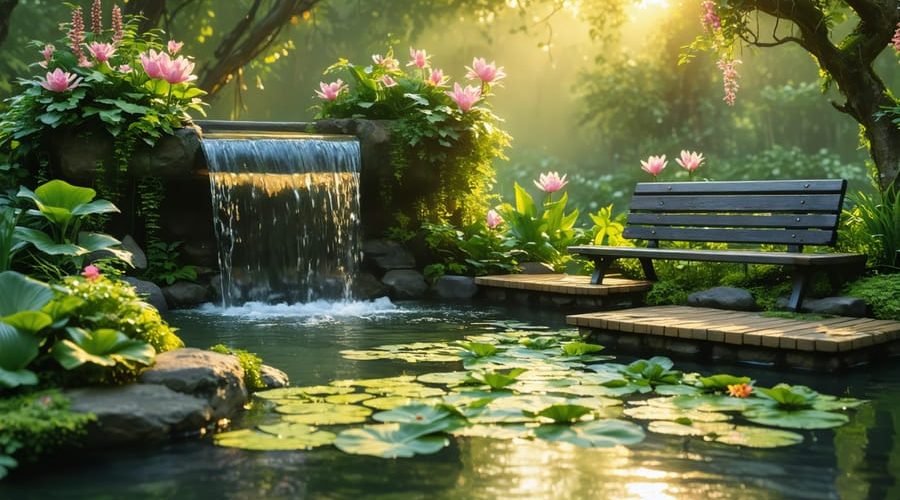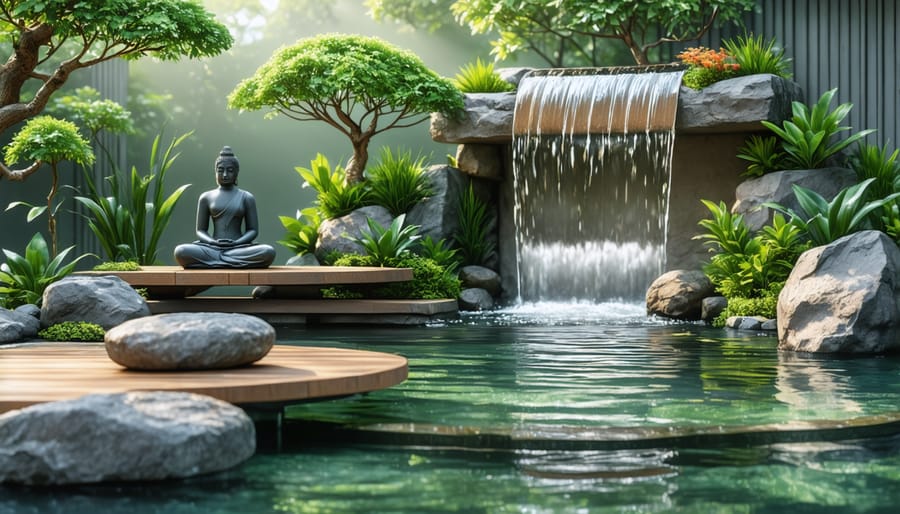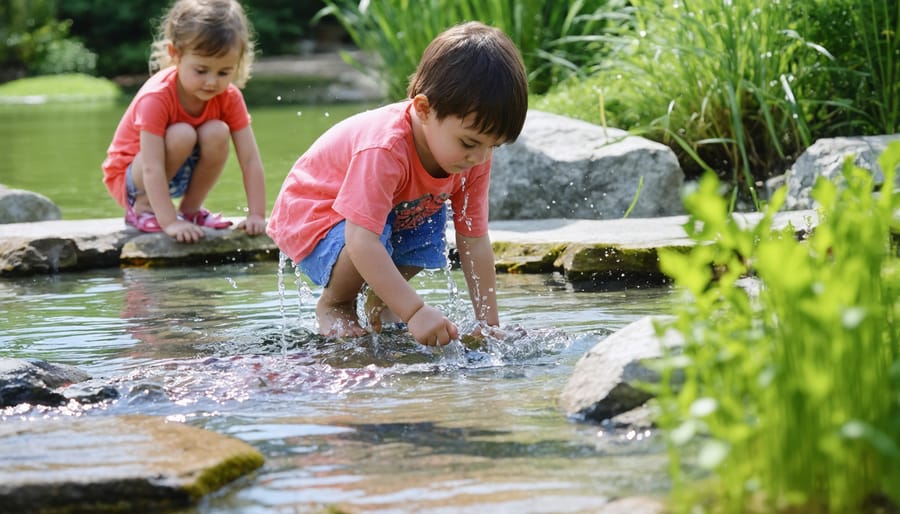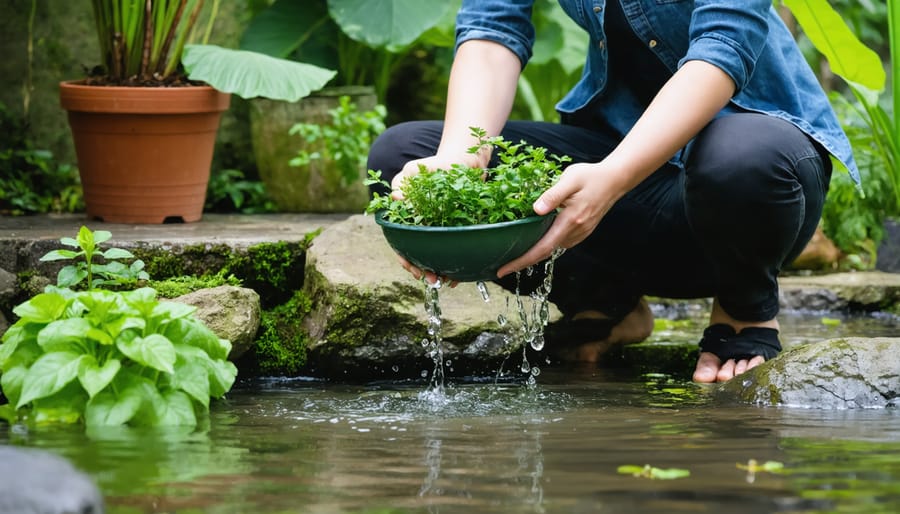
Garden Your Way to Better Health: How Water Gardens Boost Mental Wellness
Digging your hands into rich soil and nurturing plants to life isn’t just a hobby – it’s a scientifically proven path to better mental and physical health. Research shows that gardening reduces cortisol levels (our primary stress hormone) by up to 21% while boosting mood-enhancing serotonin production. Whether you’re tending to a sprawling backyard garden or nurturing a few potted herbs on your windowsill, the therapeutic benefits are profound and immediate. Gardening combines gentle physical activity, mindful focus, and connection with nature to create a powerful antidote to modern life’s stresses. From improved cardiovascular health through regular movement to enhanced cognitive function from learning new skills, the garden becomes both gym and therapy room. This natural form of healing has gained recognition among healthcare professionals, with many now prescribing “green therapy” as part of treatment plans for anxiety, depression, and recovery from physical illness. Let’s explore how you can transform your outdoor space into a sanctuary for both body and mind.
The Science Behind Garden Therapy

Stress Reduction Through Water Features
The gentle sound of flowing water has long been recognized as one of nature’s most powerful stress-relievers. Whether it’s a small tabletop fountain or a grand waterfall, water features in your garden create a peaceful sanctuary that naturally calms the mind and soothes the soul.
Research shows that the sound of moving water triggers a release of feel-good chemicals in our brains, reducing cortisol levels – the hormone associated with stress. The consistent, gentle splashing creates what scientists call “white noise,” which helps mask disruptive sounds from traffic, neighbors, or urban environments.
Beyond the auditory benefits, watching water in motion has a meditative quality that helps quiet racing thoughts. The ripples, reflections, and rhythmic movements naturally draw our attention, creating a point of focus similar to traditional meditation practices. This visual engagement can lower blood pressure and promote deeper, more relaxed breathing.
Even a simple wall fountain or small pond can transform your garden into a stress-relief zone. The combination of moving water, natural light, and garden greenery creates a multi-sensory experience that encourages mindfulness and relaxation.
Nature’s Mental Health Boost
Research has shown that getting your hands dirty in the garden does wonders for your mental health. Studies consistently demonstrate that gardening reduces stress hormones like cortisol while boosting mood-enhancing chemicals such as serotonin. Just 30 minutes of gardening can significantly lower anxiety levels and improve overall mental well-being.
The combination of physical activity, fresh air, and connection with nature creates a perfect environment for mental restoration. Scientists have found that soil contains beneficial microorganisms that act as natural antidepressants when we come in contact with them. The rhythmic nature of gardening tasks, like weeding or pruning, can create a meditative state similar to mindfulness practices.
Water features in gardens add another layer of therapeutic benefit. The sound of flowing water has been proven to lower blood pressure and reduce stress levels. Whether you’re tending to water plants or simply sitting beside a garden pond, the presence of water creates a calming atmosphere that helps quiet a busy mind. This natural form of stress relief is especially valuable in our fast-paced world, offering a peaceful retreat right in your backyard.
Educational Benefits for Different Age Groups
Children’s Cognitive Development
Water gardens provide a unique and engaging environment for children’s learning and development. The combination of water, plants, and wildlife creates a living laboratory where young minds can explore and grow. Children naturally gravitate towards water features, making them ideal tools for teaching basic scientific concepts like the water cycle, ecosystem relationships, and plant growth.
Through hands-on activities like feeding fish, planting aquatic plants, or observing pond insects, children develop important cognitive skills including pattern recognition, cause-and-effect understanding, and problem-solving abilities. The sensory-rich environment of a water garden helps strengthen memory formation and recall, as children engage multiple senses while learning.
Regular interaction with water gardens also helps improve concentration and attention spans. The calming presence of water, combined with the responsibility of caring for living things, teaches patience and nurtures emotional intelligence. These experiences create lasting memories and can spark a lifelong interest in nature and environmental stewardship, making water gardens valuable tools for both education and personal growth.

Adult Learning and Mindfulness
Water gardening offers a unique opportunity for continuous learning and mindfulness practice. As you tend to your water garden, you naturally develop a deeper understanding of aquatic ecosystems, plant life cycles, and the delicate balance of nature. This hands-on experience becomes a form of active meditation, where the gentle sounds of flowing water and the rhythmic movements of maintenance tasks help calm the mind.
Many water gardeners report that their daily garden routines become cherished moments of mindfulness. Whether it’s checking water quality, pruning aquatic plants, or simply observing fish swimming, these activities require present-moment awareness and attention to detail. This natural form of mindfulness practice can help reduce stress and anxiety while improving focus and mental clarity.
The learning process never truly ends in water gardening. Each season brings new challenges and discoveries, from understanding water chemistry to identifying beneficial insects. This continuous education keeps the mind sharp and engaged, while the physical aspects of gardening provide gentle exercise. The combination of mental stimulation and peaceful reflection makes water gardening an ideal activity for promoting lifelong learning and mindfulness practices.
Therapeutic Activities in Your Water Garden
Meditation and Relaxation Spaces
Creating a dedicated meditation space in your garden can transform it into a personal sanctuary for mindfulness and relaxation. Consider establishing a quiet corner with comfortable seating, perhaps near your water feature where the gentle sound of flowing water can enhance your meditation practice. Natural elements like smooth stones, wind chimes, and aromatic plants can engage your senses and deepen your relaxation experience.
Choose plants known for their calming properties, such as lavender, chamomile, and jasmine, to surround your meditation area. These not only provide pleasant scents but also attract butterflies and birds, adding to the peaceful atmosphere. Position your seating to face an engaging view, whether it’s your pond, a beautiful plant arrangement, or a decorative garden feature.
Create clear pathways to your meditation space using materials that feel pleasant underfoot, like smooth pebbles or soft grass. This mindful journey to your relaxation area becomes part of the therapeutic experience. Consider adding weatherproof cushions and blankets to make the space inviting year-round.
Remember that your meditation area doesn’t need to be large – even a small corner can become a powerful space for reflection and mindfulness when thoughtfully designed. The key is creating a space that feels separate from the busy world and allows you to connect with nature’s healing properties.

Hands-on Healing Activities
Get your hands dirty with these calming gardening activities that naturally promote wellness. Start with mindful planting – take time to feel the texture of the soil, observe the intricate details of each seed or seedling, and focus on the present moment as you create new life. This simple act can reduce stress and anxiety almost immediately.
Try creating a sensory garden space by incorporating plants with different textures, scents, and colors. Soft, fuzzy lamb’s ear plants, fragrant lavender, and bright, cheerful marigolds can stimulate your senses and lift your mood. Working with herbs is particularly therapeutic – the act of pruning basil or rosemary releases natural aromatherapy benefits.
Container gardening offers a manageable way to practice mindfulness. The controlled environment allows you to focus on caring for just a few plants, making it perfect for beginners or those with limited mobility. Spend time deadheading flowers, a repetitive task that can become almost meditative.
For a social healing experience, consider joining a community garden. The combination of gentle physical activity, social interaction, and connection with nature creates a powerful therapeutic effect. Even simple activities like watering plants or pulling weeds can become meaningful moments of reflection and peace when approached mindfully.
As we’ve explored throughout this article, gardening offers a wealth of therapeutic benefits that extend far beyond simply growing plants. From reducing stress and anxiety to improving physical health through gentle exercise, the act of tending to a garden can be truly transformative. The educational aspects are equally valuable, providing hands-on learning experiences about biology, ecology, and environmental stewardship.
Whether you’re creating a small herb garden on your windowsill or designing an elaborate water feature, every gardening project offers opportunities for personal growth and healing. The combination of physical activity, mindful attention, and connection with nature creates a perfect environment for both relaxation and learning.
We encourage you to start your own therapeutic gardening journey today. Begin small, perhaps with a few container plants or a simple water feature, and gradually expand as your confidence grows. Remember, the goal isn’t perfection – it’s about creating a space that brings you joy, peace, and opportunities for growth.
Let the garden become your sanctuary, classroom, and therapy space all in one. Your mind, body, and spirit will thank you for it.
